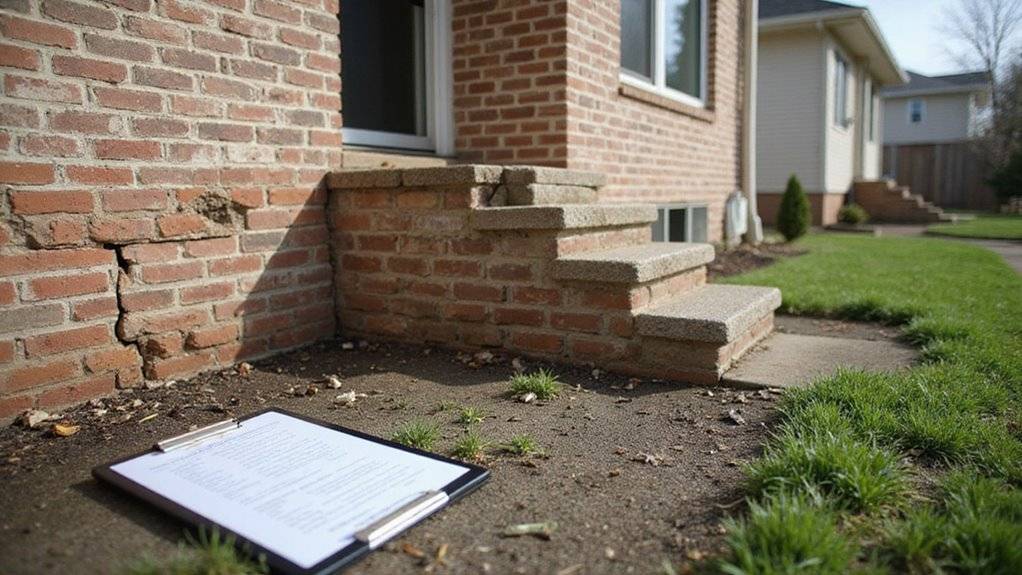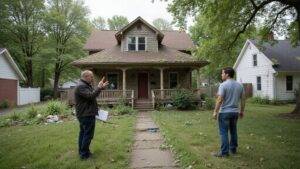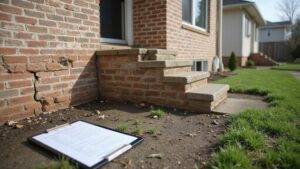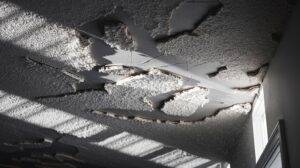Foundation problems are more than just an eyesore. They can cause serious trouble when selling your home. Cracks, uneven floors, and other signs of damage can scare buyers away fast.
These issues may cause lenders and insurers to back off. You could lose potential buyers and see your home’s value drop by 10-20%. The longer you wait, the bigger the problem gets. Foundation problems can significantly lower your home’s value and make it harder to sell.
Fixing these issues quickly is the best way to protect your investment. This blog will show you how to spot, address, and solve foundation problems to keep your home’s value strong.
Key Takeaways
- Foundation problems can lower a home’s value by 10% to 20%, making it less competitive in the market.
- Visible foundation issues deter buyers, resulting in fewer offers and longer time on the market.
- Unrepaired foundation damage often leads to higher repair costs and further property devaluation over time.
- Homes with foundation problems may face appraisal challenges, insurance premium increases, and mortgage approval difficulties.
- Providing documentation of foundation repairs can help restore buyer confidence and reduce the negative impact on value.
Understanding Foundation Problems
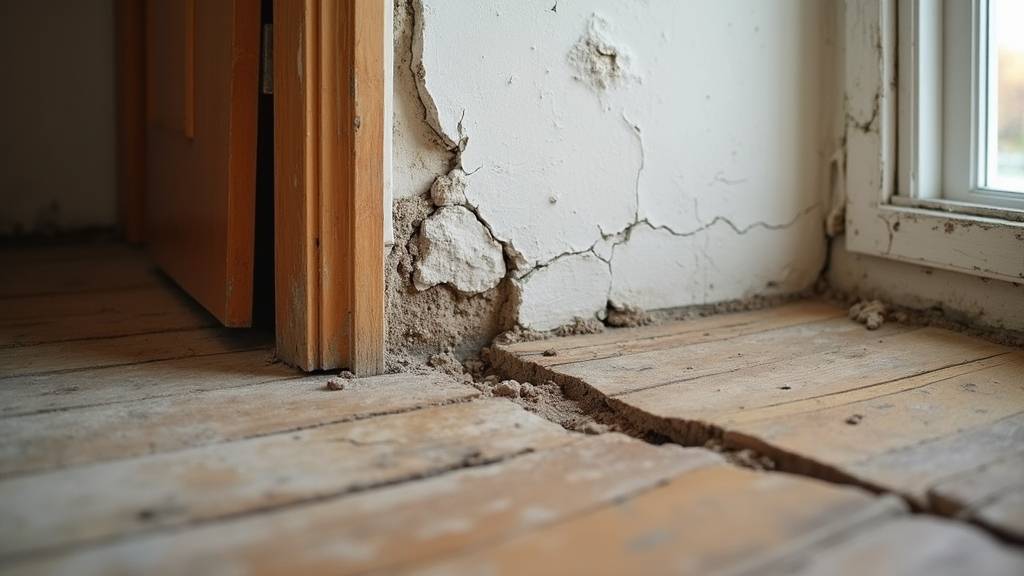
Foundation problems matter because they affect your home’s safety and value. If you understand these issues, you can protect your investment. Homeowners should pay attention to any warning signs. Recognizing fair cash offers can help you decide when to sell if repairs become too costly. Most foundation problems start with bad soil conditions. Expansive clay, poor drainage, or moving ground can make the soil unstable.
If the soil shifts, the foundation may crack, sink, or tilt. Foundation leveling helps fix these problems by returning the base to its original position. Ignoring foundation issues can lead to higher repair costs. Unresolved problems may lower your home’s value by up to 20%. Additionally, consulting a real estate lawyer can ensure you understand your options and legal implications when addressing foundation issues.
Common Signs of Foundation Issues
You should watch for cracks in walls, uneven or sloping floors, and doors or windows that stick, as these are among the most reliable indicators of foundation issues. Industry reports show that over 60% of homes with foundation problems exhibit one or more of these symptoms.
Recognizing foundation defects early can help prevent costly repairs and protect your investment. Being aware of symptoms of foundation problems allows homeowners to seek professional assessments before issues worsen. Identifying these warning signs early lets you address structural concerns before they impact your property’s value.
Cracks in Walls
Cracks in walls can mean there is a problem with your home’s foundation. Small, thin cracks often happen because of normal settling or changes in humidity. If you notice bigger cracks or cracks that keep getting longer, there may be a serious issue.
Cracks that run diagonally from doors or windows, or go straight up and down, are signs of foundation trouble. Studies show these patterns often mean the foundation is shifting. If you ignore these cracks, the problems can get worse and repairs may become more expensive.
Foundation repairs, like leveling, may be needed to make your home safe again. Even after fixing the foundation, cracks can lower the value of your home. Buyers may worry about future repairs if they see cracks during a home tour.
Uneven or Sloping Floors
Uneven or sloping floors usually mean there is a problem with your home’s foundation. Floors may tilt or feel odd to walk on when the foundation shifts. This is often an early warning sign of damage below your home.
Foundation settlement often happens if the soil under your house is not packed tightly. When soil shifts or sinks, the foundation can move, causing the floors to become uneven. If you live in an area with poor soil, your home may be at higher risk.
Studies show that about 25% of homes with loose or expansive soil develop uneven floors. Uneven floors can lower your home’s value and make buyers worry about repairs. If you notice sloping floors, you should act quickly to prevent further damage.
Sticking Doors and Windows
Doors and windows can start to stick or become hard to open if your home’s foundation moves. Foundation shifts change the shape of doorways and window frames. Even small changes can cause these problems.
Research shows that 60% of homes with moving foundations have at least one sticking door or window. This makes sticking doors and windows an important early warning sign.
You may notice doors jamming, windows getting stuck, or gaps around frames. New cracks near windows are also common signs.
If you act quickly, foundation repairs can fix alignment and protect your home’s value. Ignoring these signs may lead to bigger and more expensive repairs later.
Types of Foundation Damage
You can recognize different types of foundation damage by checking for cracks in walls, floors, and ceilings. Uneven floors or gaps around windows and doors are also warning signs. If you notice any of these, your home’s value may be at risk. Addressing mold issues and foundation problems early can prevent further deterioration and protect your property’s worth.
Detecting early signs of soil settlement can help you take timely action before significant damage occurs. Horizontal cracks can mean major structural problems. Vertical cracks often show normal settling but should still be monitored. Bulging walls and moisture in the basement may show serious damage. If minor cracks are left untreated, your home’s value could drop by 10%.
Severe foundation damage may lower it by 20% or more. You should repair issues quickly to prevent further problems. Foundation reinforcement and soil stabilization are common solutions. Early repairs help protect your investment. If you plan to sell your home, fixing foundation issues can make buyers feel more confident.
Causes of Foundation Problems
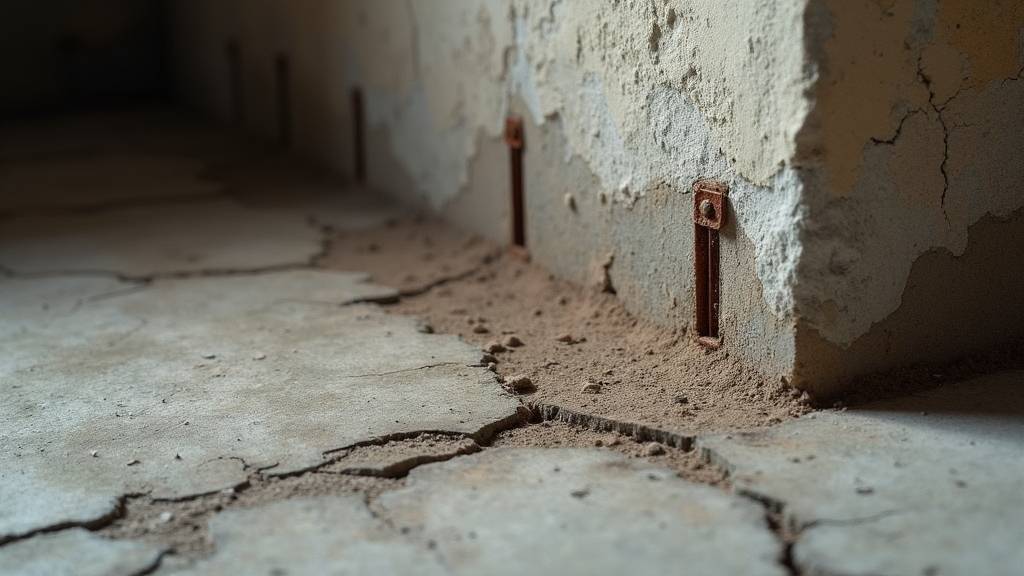
You need to recognize that soil movement and erosion, poor water drainage, and subpar construction materials are primary drivers of foundation problems. Studies show that expansive soils cause up to 60% of foundation failures nationwide. When you address these factors early, you reduce the risk of costly structural damage and protect your home’s value.
Recognizing local expertise can be crucial in diagnosing and preventing foundation issues before they worsen. Additionally, implementing proper drainage solutions can significantly mitigate soil-related movement that contributes to foundation instability.
Soil Movement and Erosion
Soil movement and erosion are major reasons for foundation problems. When soil shifts or washes away, the foundation can crack or settle unevenly. These issues can weaken the entire structure.
Expansive soils are especially risky because they swell and shrink with changes in moisture. Studies show that more than half of foundation failures in the U.S. are due to these soils. Even small soil movements can cause serious damage.
Homeowners should use landscaping and drainage to prevent erosion. If you ignore soil problems, your property may lose value. Buyers may avoid homes with possible foundation repairs.
Water Drainage Issues
Improper water drainage is a main cause of foundation problems. Water near your foundation can press against walls and cause cracks. If drainage is poor, your home is at risk for leaks and damage.
The American Society of Home Inspectors reports that 60% of U.S. homes have drainage-related foundation issues. Persistent moisture can weaken the foundation and lower your home’s value. If you ignore drainage, repairs can become expensive.
You should check your yard’s slope, downspout locations, and water flow patterns. If water pools near your home, drainage solutions are needed. Adding basement waterproofing and drains can help avoid future problems.
Proper water management protects your foundation and your investment. If you act early, you can prevent costly repairs. Good drainage also helps keep your home’s value stable.
Construction Material Quality
Construction material quality affects the strength of your home’s foundation. Low-quality materials can cause cracks, settling, and damage over time. Poor concrete or mortar makes foundations weak and uneven.
Research shows homes built with cheap materials may move up to 40% more in ten years. Inspectors check material quality when assessing foundations. If they find weak materials, the home’s value may drop.
If you invest in good materials during construction, you reduce future repair risks. Quality materials help keep floors even and doors working properly. Using strong materials protects your property’s value.
Impact on Property Appraisal
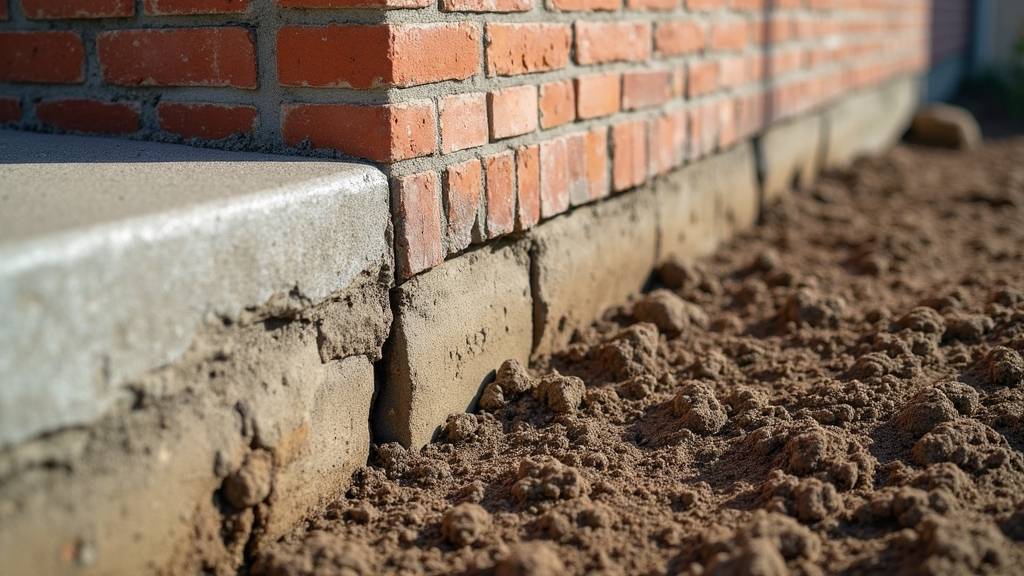
Foundation problems usually lower your home’s appraised value. Appraisers check for damage and signs of movement. If there are issues, your home may be worth 10% to 20% less. A local North County, MO expert can better assess the extent of damage and help you understand how it impacts your property value.
Appraisers look for cracks, uneven floors, and water damage. They also check if you have fixed any foundation problems. If you have made repairs, your home’s value may not drop as much. Documentation of repairs and preventive steps can help. If you do not address these problems, it may be hard to sell or refinance your home. Quick action can protect your investment.
Buyer Perception and Concerns
Most buyers see foundation problems as a serious warning sign. These issues suggest possible risks and future repair costs. If a home has foundation concerns, buyers often worry about hidden damage and ongoing stability. Foundation problems raise red flags for buyers, signaling hidden risks, expensive repairs, and long-term stability concerns.
Homes with foundation repairs usually take longer to sell. They often sell for less money due to lower buyer confidence. Even with repair warranties, many buyers remain cautious.
Buyers may fear that problems will return or the home’s value will drop. In strong markets, these worries can help buyers negotiate lower prices. If buyers have doubts, they might decide not to buy at all.
If you believe the foundation is weak, you may not want to invest. This perception can reduce demand and lower the home’s market value. Market perception of the condition of the foundation directly affects buyer interest. Understanding your options when selling a house with foundation issues can help you make informed decisions and potentially sell your home faster.
How Lenders View Foundation Issues
Lenders scrutinize foundation problems because they directly affect a property’s collateral value and future marketability. You’ll likely face stricter mortgage approval criteria, as data shows homes with structural issues are more frequently denied financing. Appraisers also adjust valuations downward, which can reduce your borrowing power and complicate the sale process.
Mortgage Approval Challenges
Getting a mortgage for a home with foundation problems is difficult. Lenders see these homes as risky investments. They worry about safety and lower resale value.
Lenders usually ask for a foundation inspection. Some may also want a report from a structural engineer. These reports help them understand the damage and repair costs.
Buyers may need to pay higher interest rates or make larger down payments. Lenders often set stricter rules for loan approval. Some may also require repairs before closing.
Insurance requirements can be tougher for these homes. If a buyer does not fix the issues, mortgage approval may be denied. Conventional lenders may not offer loans for these properties.
Impact on Appraisal
Even small foundation problems can reduce your property’s appraised value. Appraisers look for structural risks and repair needs when valuing a home. They use market data and repair estimates to help set the value.
If your house has foundation settlement, the value may drop by 10% to 20%. The exact amount depends on how bad the problem is and local demand. Lenders use these values to decide if they will approve a loan.
Unresolved soil stability issues can also lower your appraisal. Lenders see these problems as a risk to their investment. If you fix the issues, it may help protect your home’s value.
Disclosure Requirements for Sellers
Legal obligations require home sellers to tell buyers about foundation problems. Most states have laws that make this disclosure mandatory. Sellers must give honest and full details about any known foundation or soil issues. Failing to disclose known problems can lead to legal disputes and financial liabilities.
If you hide these problems, buyers may sue you or cancel the contract. You could also face fines or pay for repairs later. Honest disclosure helps buyers make better choices and may affect their loan approval.
Key information you must share includes cracks, settling, or repairs to the foundation. You should mention any inspections or reports about the structure. Sellers also need to note previous soil stabilization work or clear signs of movement. Additionally, disclosure requirements vary by state and may include documentation of past inspections or repairs.
Being aware of disclosure laws ensures compliance and helps prevent future conflicts related to property condition disclosures.
Repair Costs and Home Value
Foundation repair costs can affect your home’s market value. Buyers often lower their offers if repairs are needed. The price of repairs and their visibility influence your final sale price.
A professional inspection can show the extent of damage. Repair costs usually range from $2,000 to $7,500. Severe problems may cost more than $15,000.
If you choose a reputable contractor, you could recover some value. Homes with recent foundation repairs may still sell for less than similar homes. Inspection reports make buyers aware of past issues. Trust in local experts can also influence the perceived value and confidence of potential buyers.
Negotiating Home Price With Foundation Damage
Negotiating home price with foundation damage means understanding the repair costs. Sellers need facts to discuss price changes with buyers. Buyers may ask for a lower price or for repairs to be done before closing.
Foundation repairs can cost from $2,000 to $7,500. Major repairs may cost more than $15,000. Getting written estimates from licensed contractors will help you know the real cost. Foundation repairs typically range from $2,000 to $7,500, but major issues can exceed $15,000—get written estimates for accuracy.
Sellers should share all inspection reports and repair records. If you offer to pay some or all repair costs, base your offer on these estimates. You can also compare your home’s value to homes with recent repairs.
If buyers want repairs before closing, be ready to talk about timing and who pays. Using these steps keeps the process honest and clear. This approach gives you a better position in price talks.
Insurance Considerations
You need to scrutinize your homeowners insurance policy, as most providers exclude coverage for foundation issues caused by settling, poor drainage, or earth movement. Claims related to foundation repairs can trigger significant premium increases or even non-renewal, exposing you to greater financial risk. Industry data shows that insurers often classify properties with foundation problems as high-risk, which directly impacts your costs and options.
Coverage Limitations and Exclusions
Most homeowners insurance policies do not cover foundation problems. Coverage is limited, and many foundation issues are excluded. You should always check your policy for these details.
If foundation damage is not caused by a listed peril, your claim will likely be denied. Insurers usually exclude common causes of foundation damage. This means you may have to pay for repairs yourself.
Typical exclusions are damage from soil movement, normal wear and tear, or poor drainage. Tree root damage and construction defects are also not covered. If you do not have extra protection, these repairs can be costly.
Understanding these exclusions helps you avoid surprises. If you want coverage, consider buying extra protection or a separate policy. Being prepared can protect your home’s value and your finances.
Premium Increases and Risks
Insurance companies often raise your premiums after you file a foundation claim. They see homes with foundation issues as higher risk. Premium increases usually range from 10% to 25%.
Insurers may also add higher deductibles or remove future foundation coverage. This can lead to more out-of-pocket costs if new damage happens. If foundation problems continue, insurers might limit your coverage options.
Insurance databases can flag your home due to repeated foundation issues. This can make it harder to get affordable policies. Unresolved foundation problems make your home less attractive to insurers.
Potential Legal Implications
Foundation problems can cause serious legal issues for homeowners, buyers, and sellers. These issues often affect a home’s safety and value. Understanding your legal duties is important if you have foundation concerns.
Homeowners must share known foundation problems with buyers. State laws often require you to disclose any defects. Failure to do so can result in lawsuits and financial losses.
If you hide foundation issues, buyers may sue for fraud or misrepresentation. Courts can force you to pay damages or cancel the sale. Mortgage lenders and insurance companies may also deny coverage or loans if problems exist.
Always keep records of repairs and all communication about the foundation. Buyers can ask for lower prices or end the contract if major issues are found. Following these steps helps you avoid legal trouble and protects your interests.
Preventative Measures and Maintenance
Regular maintenance helps prevent expensive foundation repairs. Annual home inspections can detect up to 85% of foundation problems early. Early detection keeps damage from becoming serious.
Waterproofing your foundation is important. Proper grading, working gutters, and sealing cracks stop extra water from reaching the foundation. Homes with good drainage have 50% fewer foundation issues.
Routine care also protects your home. If you watch your landscaping and fix plumbing leaks quickly, you lower repair costs. These steps help keep your home strong and valuable.
Selling a Home With Foundation Problems
Selling a home with foundation problems can be challenging. Buyers may offer less money if the foundation needs work. Homes with these issues often sell for 10-20% below market value.
A structural assessment is important before listing your home. This will show the extent of any problems. If you know about foundation issues, you must tell potential buyers.
You can fix the foundation before selling if it is possible. Repairs may help you get a better price. If you cannot fix it, consider lowering your asking price.
Providing repair documents can help buyers trust your home’s condition. These records show the work is complete and may ease buyer concerns. Taking these steps can make the selling process smoother.
Conclusion
Foundation problems can greatly decrease your home’s value. If you ignore these issues, buyers may lose interest or offer less money. Proper maintenance and documentation can help reduce the impact.
If you need to sell a home with foundation problems, we can help. We buy houses for cash, even if they need repairs. Freedom Path Investors offers a simple and fast selling process.
If you want a fair cash offer, contact us today. We will review your situation and answer your questions. Let Freedom Path Investors help you move forward with confidence.

